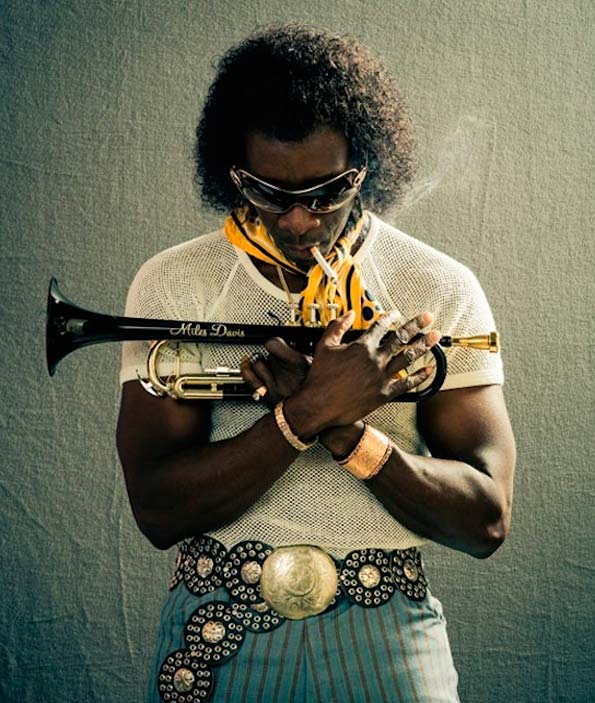
 A labor of love over a decade in the making
from director/co-writer Don Cheadle (Avengers:
Age of Ultron, Iron Man 3), his first feature attempt at
either, Miles Ahead is an unorthodox and interpretive take on
legendary jazz genius Miles Davis, eschewing the facts of the
trumpeter's life for a metaphorical representation of what the artist
had gone through during a key stage in his career, putting him in the
middle of a loose-hanging crime caper. Using the device of the
'unreliable narrator' at the crux of this Miles Davis introspection,
Cheadle plays nearly as improvisational with the traditional biopic as
Davis himself would in his perpetual experimentation with music.
Cheadle attempts to riff the way Miles might have, trying to uncover a
larger truth about who he really is, even if he has to use a good deal
of fabrication to bring forward those truths out. What the film
can be said to be really about is who controls the music of an artist signed to a
major label, as the tug-of-war exists throughout Miles Ahead
between Miles and his record label, Columbia Records.
A labor of love over a decade in the making
from director/co-writer Don Cheadle (Avengers:
Age of Ultron, Iron Man 3), his first feature attempt at
either, Miles Ahead is an unorthodox and interpretive take on
legendary jazz genius Miles Davis, eschewing the facts of the
trumpeter's life for a metaphorical representation of what the artist
had gone through during a key stage in his career, putting him in the
middle of a loose-hanging crime caper. Using the device of the
'unreliable narrator' at the crux of this Miles Davis introspection,
Cheadle plays nearly as improvisational with the traditional biopic as
Davis himself would in his perpetual experimentation with music.
Cheadle attempts to riff the way Miles might have, trying to uncover a
larger truth about who he really is, even if he has to use a good deal
of fabrication to bring forward those truths out. What the film
can be said to be really about is who controls the music of an artist signed to a
major label, as the tug-of-war exists throughout Miles Ahead
between Miles and his record label, Columbia Records.
Set mainly during the course of about a day in the musician's life in
New York's Upper West Side (Cincinnati substitutes) in 1979, when
creatively burnt-out Miles had taken a self-imposed
five-years-and-counting break from releasing new music. Columbia
Records had grown increasingly challenged in their relationship with
their most eccentric and erratic recording artist, who claims he would
give them something new if they paid him the $20,000 they owe him,
with both parties knowing they could all make so much more if he were
to hand over the studio recording reel that he'd been working on in
the interim. Enter a man claiming to be a highly ambitious
Rolling Stone reporter Dave Brill (a fictional character, reportedly
scripted in to bring on a white lead actor like Ewan McGregor (Jane
Got a Gun, Mortdecai), to help
get funding), who wants to not only help his publication sell papers
by getting the reclusive Miles Davis to record an increasingly rare
in-depth interview with him, but to also facilitate seeing Miles hand
over that unpublished recording that is sure to make music history.
When the master tape ends up missing, the volatile Miles takes matters
into his own hands, resulting in a life-or-death struggle to wrest
ownership back where he feels it belongs.
Cheadle bring about a great deal of visual flair to
complement the vibrant sound of Miles' music. A fine an actor as
could ever be chose to play Miles, Cheadle looks and acts the part
better than most who are leads in musical biopics, and has even spent
four years learning to play so that he could play and key to Miles'
actual music that's dubbed over his own during the film. Miles Ahead
also delves into a motivating factor for Davis to maintain at least a
modicum of money and fame -- his addiction to cocaine. Part of
his problem with his addiction as well as the perceived loss of his
creative mojo stems from his reminiscences on the 'woman that got
away', Frances Taylor (Corinealdi, The Invitation), a dancer who Davis would eventually marry in
the late 1950s. It would end up being a rocky relationship that
brought forth a great many regrets to Davis, as his ego would continue
to stand in the way with being able to embrace his loving partner
fully.
Taylor is painted as the lone person in Miles'
life who isn't merely trying to use exposure to him for their own
advancement. Reporters want a leg-up in the industry by getting
a big scoop, record label execs want to push out another high-profile,
award-winning record, and music producers want Davis to use his
proverbial 'Midas Touch' to give his approval for their hungry artists
looking to get a break in an industry where there are hundreds who
want to be the heir to the Miles Davis throne. Even drug dealers
are willing to cut Davis a discount rate for an autograph, though even
then, Davis is reluctant to have to give up any piece of himself if it
isn't of his own volition.
Frances has sacrificed her own passions to make
it work with Miles, and in return, she wants nothing but to have a
loving husband and to be appreciated for her being the giving,
nurturing person in his life. Miles' response to having wronged
her with careless and abusive behavior is to do that which he would
any other person in his life -- to buy her loyalty and smooth over
indiscretions with gifts. And Miles' additional reaction to not
being able to be the kind of man Frances needs is to rely only on
himself, "self-medicating" with a potentially disastrous cocktail of
coke, alcohol, and prescription pain medication for a degenerative hip
condition that made it painful for him to walk.
There are several allusions to the plight of
Miles Davis to that of a boxer, a fighter who needs to get that edge
back, that hunger, to make him a success again. He's been too
long out of the arena to know what to do anymore, seeing that hunger
in other up-and-comers to contrast where he once was in his career,
and where he has devolved. It should come as no surprise that
the climax of the film is sparked by a confrontation in the middle of
a boxing match, which puts Miles Davis toe to toe with his main
nemesis, a sly talent agent (Stuhlbarg,
Trumbo) who is desperately vowing to take control
of his music for his own ends, causing the down-and-out artist to
spring to life again to fight for something that, ironically, would
not have had much value to others, but means the world to him.
He's fighting for his life -- his essence.
In many respects, Miles Ahead reminds me of another
fictionalized account of an artist of renown influence, the
interpretation of the life of comedian Richard Pryor in Jojo
Dancer Your Life is Calling, another film that struggles to
maintain a tone, and yet yields so many interesting takes on the life
of someone once at the top of their creative peak, struggling to
maintain their own voice amid the many influences that threaten to
stifle the ingenuity that got them to that peak in the first place.
Cheadle takes quite a few risks, some of them paying off, other not as
much, but Miles Ahead remains an interesting impressionist
take on the essence of Miles Davis, who would rather use his tight
lips to let the trumpet say what his mouth would rather not, to make
it worthwhile for viewers who don't mind the heaping helping of
creative license employed in getting to the root of the matter on one
of the most troubled, but most brilliant of artists in any medium in
the 20th century, or, as the film suggests in its colorful, concert
performance finale, to the current day and beyond. Like
improvisational jazz, it's an acquired taste, and while Cheadle isn't
quite to cinema what Miles is to music, it's hard to disrespect a man
for trying to, literally and figuratively, blow his own horn.
Qwipster's rating
:







©2016 Vince Leo

 A labor of love over a decade in the making
from director/co-writer Don Cheadle (
A labor of love over a decade in the making
from director/co-writer Don Cheadle (